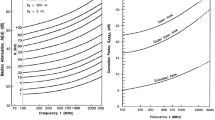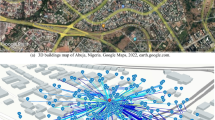Abstract
The reliability and accuracy of radio propagation models depends on the unique localized features in the area under study. In this paper, we calibrate empirical radio propagation models for 1800 MHz cellular network planning in Lagos Metropolis, Nigeria. Drive test are conducted to obtain measured data within suburban and dense urban propagation environment. Received Signal Strength (RSS) and path loss values of radio signals in 1800 MHz cellular networks are recorded for model calibration and evaluation. COST 231–Hata model achieved the closest prediction results relative to the field measurement. Mean Error (ME), Standard Deviation (SD) and Root Mean Square (RMS) results are 11.004 dB, 12.194 dB and 16.43 dB respectively in dense suburban, while the corresponding results are 9.151 dB, 8.151 dB and 12.254 dB in dense urban. ME of all the calibrated propagation prediction models reduced to nearly zero (\(\approx 0\) dB). Also, the SD and the RMS fall within the calibration quality target with ME as less than 1 dB and SD is less than 8.5 dB for each of the calibrated models. In conclusion, the proposed calibrated path loss models achieved minimum mean error and standard deviation. Prediction results improved when terrain type and clutter data were taken into account during path loss calculations.
Access this chapter
Tax calculation will be finalised at checkout
Purchases are for personal use only
Similar content being viewed by others
References
Popoola, S.I., Oseni, O.F.: Empirical path loss models for GSM network deployment in Makurdi, Nigeria. Int. Refereed J. Eng. Sci. 3(6), 85–94 (2014)
Oseni, O.F., et al.: Comparative analysis of received signal strength prediction models for radio network planning of GSM 900 MHz in Ilorin, Nigeria. Int. J. Innov. Technol. Exploring Eng. 4(3), 45–50 (2014)
Bhushan, N., et al.: Network densification: the dominant theme for wireless evolution into 5G. IEEE Commun. Mag. 52(2), 82–89 (2014)
Chen, M., et al.: Body area networks: a survey. Mobile Netw. Appl. 16(2), 171–193 (2011)
Negra, R., Jemili, I., Belghith, A.: Wireless body area networks: applications and technologies. Procedia Comput. Sci. 83, 1274–1281 (2016)
Latré, B., et al.: A survey on wireless body area networks. Wireless Netw. 17(1), 1–18 (2011)
Gondara, M.K., Kadam, S.: Requirements of vertical handoff mechanism in 4G wireless networks. arXiv preprint arXiv:1105.0043 (2011)
Dotche, K.A., Sekyere, F., Banuenumah, W.: LPC for signal analysis in cellular network coverage. Open Access Libr. J. 3(07), 1 (2016)
Vegni, A.M., et al.: A combined vertical handover decision metric for QoS enhancement in next generation networks. In: 2009 IEEE International Conference on Wireless and Mobile Computing, Networking and Communications. IEEE (2009)
Parmar, K.J., Nimavat, V.: Comparative analysis of path loss propagation models in radio communication. Int. J. Innov. Res. Comput. Commun. Eng. 3(2), 840–844 (2015)
Luebbers, R.: Propagation prediction for hilly terrain using GTD wedge diffraction. IEEE Trans. Antennas Propag. 32(9), 951–955 (1984)
Mohtashami, V., Shishegar, A.: Modified wavefront decomposition method for fast and accurate ray-tracing simulation. IET Microwaves Antennas Propag. 6(3), 295–304 (2012)
Hufford, G.A.: An integral equation approach to the problem of wave propagation over an irregular surface. Q. Appl. Math. 9(4), 391–404 (1952)
Zelley, C.A., Constantinou, C.C.: A three-dimensional parabolic equation applied to VHF/UHF propagation over irregular terrain. IEEE Trans. Antennas Propag. 47(10), 1586–1596 (1999)
Popoola, S.I., Oseni, O.F.: Performance evaluation of radio propagation models on GSM network in urban area of Lagos, Nigeria. Int. J. Sci. Eng. Res. 5(6), 1212–1217 (2014)
Acknowledgement
This work was carried out under the IoT-Enabled Smart and Connected Communities (SmartCU) research cluster of the Department of Electrical and Information Engineering, Covenant University, Ota, Nigeria. The research was fully sponsored by Covenant University Centre for Research, Innovation and Development (CUCRID), Covenant University, Ota, Nigeria.
Author information
Authors and Affiliations
Corresponding author
Editor information
Editors and Affiliations
Rights and permissions
Copyright information
© 2020 Springer Nature Switzerland AG
About this paper
Cite this paper
Abolade, R.O., Akintade, D.J., Popoola, S.I., Semire, F.A., Atayero, A.A., Misra, S. (2020). Calibration of Empirical Models for Path Loss Prediction in Urban Environment. In: Gervasi, O., et al. Computational Science and Its Applications – ICCSA 2020. ICCSA 2020. Lecture Notes in Computer Science(), vol 12254. Springer, Cham. https://doi.org/10.1007/978-3-030-58817-5_23
Download citation
DOI: https://doi.org/10.1007/978-3-030-58817-5_23
Published:
Publisher Name: Springer, Cham
Print ISBN: 978-3-030-58816-8
Online ISBN: 978-3-030-58817-5
eBook Packages: Computer ScienceComputer Science (R0)




